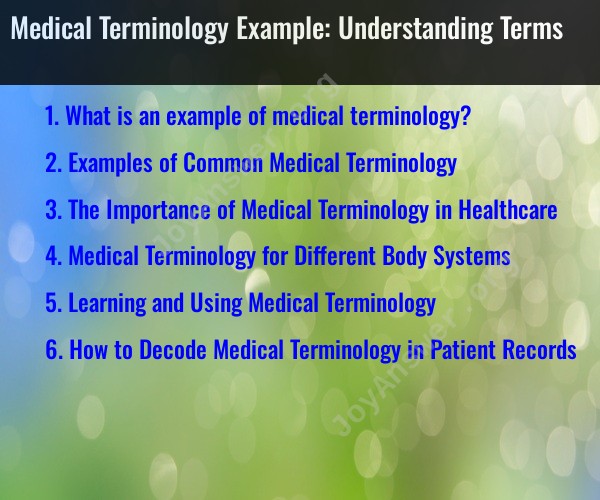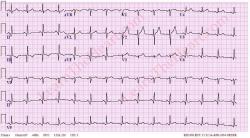What is an example of medical terminology?
Medical terminology is a specialized language used in the field of medicine to describe and communicate medical information precisely. Here's an example of medical terminology:
Term: Myocardial Infarction
Definition: Myocardial infarction refers to the medical term for a heart attack. It is a condition that occurs when there is a blockage of blood flow to a part of the heart muscle, leading to damage or death of heart tissue due to the lack of oxygen.
In this example:
- "Myo-" pertains to "muscle."
- "Cardio-" relates to the "heart."
- "Infarction" refers to the "death of tissue due to lack of blood supply."
Medical terminology often involves the use of prefixes, roots, and suffixes to create terms that are precise and descriptive. Understanding medical terminology is essential for healthcare professionals to communicate effectively and accurately in the medical field.
Examples of Common Medical Terminology
Medical terminology plays a crucial role in effective communication and documentation within the healthcare field. Here are some common examples of medical terminology:
Anatomy: Terms related to the structure of the body, such as "cardiac" (heart), "pulmonary" (lungs), and "gastrointestinal" (digestive tract).
Physiology: Terms related to the function of the body, such as "respiration" (breathing), "digestion" (breakdown of food), and "circulation" (blood flow).
Pathology: Terms related to diseases and conditions, such as "diabetes" (high blood sugar), "hypertension" (high blood pressure), and "cancer" (uncontrolled cell growth).
Pharmacology: Terms related to medications, such as "analgesic" (pain reliever), "antibiotic" (infection fighter), and "antidepressant" (mood stabilizer).
Procedures and Treatments: Terms related to medical interventions, such as "surgery," "radiotherapy," and "chemotherapy."
The Importance of Medical Terminology in Healthcare
Medical terminology is essential for effective communication and documentation within the healthcare field for several reasons:
Accuracy and Precision: Standardized medical terms ensure clear and concise communication among healthcare professionals, reducing the risk of misinterpretations and errors.
Documentation and Record-Keeping: Accurate medical terminology is crucial for proper documentation of patient care, including diagnoses, treatments, and medications.
Patient Education: Understanding medical terminology allows healthcare providers to explain complex medical concepts to patients in a clear and understandable manner.
Professional Development: Healthcare professionals continuously learn and refine their medical terminology knowledge to stay up-to-date with advancements in medicine.
Medical Terminology for Different Body Systems
Medical terminology is organized based on different body systems, allowing for specific and accurate descriptions of anatomical structures, physiological processes, and pathological conditions. Here are some examples:
Cardiovascular System: "Atherosclerosis" (narrowing of arteries), "arrhythmia" (irregular heartbeat), "myocardial infarction" (heart attack).
Respiratory System: "Asthma" (chronic airway inflammation), "pneumonia" (lung infection), "emphysema" (destruction of lung tissue).
Nervous System: "Alzheimer's disease" (progressive brain disorder), "epilepsy" (seizure disorder), "stroke" (loss of blood flow to the brain).
Digestive System: "Gastritis" (inflammation of the stomach lining), "ulcerative colitis" (inflammatory bowel disease), "pancreatitis" (inflammation of the pancreas).
Musculoskeletal System: "Arthritis" (joint inflammation), "osteoporosis" (bone loss), "tendonitis" (inflammation of a tendon).
Learning and Using Medical Terminology
Learning and effectively using medical terminology requires a combination of strategies:
Vocabulary Building: Start by learning basic medical terms and their definitions, gradually expanding your vocabulary through practice and exposure.
Context and Usage: Understand the context in which medical terms are used, such as within specific body systems or disease processes.
Resources and Tools: Utilize medical dictionaries, online resources, and interactive tools to enhance your learning experience.
Practice and Application: Practice using medical terminology in written and spoken communication, such as during patient interactions or clinical documentation.
How to Decode Medical Terminology in Patient Records
Decoding medical terminology in patient records requires a systematic approach:
Identify Root Words: Break down complex medical terms into their root words, prefixes, and suffixes to understand their meaning.
Context and Association: Consider the context of the medical term within the patient record, such as the associated diagnosis or procedure.
Reference Resources: Utilize medical dictionaries, online resources, or consult with healthcare professionals to clarify unfamiliar terms.
Seek Clarification: If unsure about the meaning of a medical term, don't hesitate to ask a healthcare provider for clarification to ensure accurate understanding.












